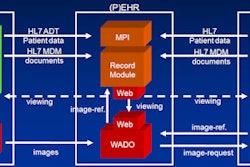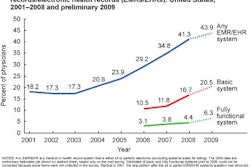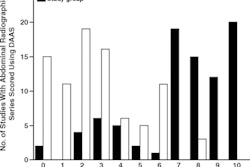How effective are electronic health record (EHR) systems in improving the efficiency and quality of healthcare services in U.S. hospitals? Right now, not very -- at least according to a study of nearly 3,000 hospitals that found that EHR systems minimally affected several types of outcomes measures.
Published in the April issue of Health Affairs, the study showed that simply "going digital" and adopting EHR technology will not automatically improve the quality and efficiency of healthcare delivery in the U.S. Rather, policies are needed that encourage the use of EHRs in ways that will lead to improvements, with the goal of identifying best practices, according to the study's principal investigator, Catherine DesRoches, Ph.D., assistant professor at Massachusetts General Hospital's Institute for Health Policy in Boston (Health Affairs, April 2010, Vol. 29:4, pp. 639-646).
Methodology and analysis
The study is based on the findings of an American Hospital Association (AHA) healthcare IT survey sent to its nearly 5,000 member hospitals in 2008. The AHA sent its annual Information Technology Supplement survey to the chief operating officers of 4,840 nongovernment hospitals that represent 97% of all U.S. urban and community hospitals. Sixty-three percent responded, and 2,952 completed surveys were used for analysis.
The Institute for Health Policy defined "basic" EHR utilization as adopting at least 10 key functions in at least one major clinical unit of a hospital. "Comprehensive" utilization was defined as adopting 24 clinical functions across all major clinical units.
To examine performance on quality metrics, researchers used 2008 data on process measures that the Hospital Quality Alliance of Washington, DC, acquired from 4,460 acute care hospitals in all 50 states and the District of Columbia. From this data, the research team created summary scores and mortality rates of patients being treated for acute myocardial infarction, congestive heart failure, and pneumonia, as well as prevention of surgical complications.
The hospital efficiency measures used included length of stay, 30-day readmission rates, and inpatient costs, all risk-adjusted. Medicare data were used to estimate each hospital's observed costs compared to each hospital's expected costs, based on the average costs that all hospitals incur for treating similar patients. The models accounted for the case mix of a hospital's patients based on geographic data, the percentage of economically disadvantaged and charity patients it treated, and other community factors outside the hospital's control.
The researchers began by examining whether hospitals with comprehensive, basic, or no EHR systems had higher performance on Hospital Quality Alliance performance summary scores, and whether they had lower 30-day risk-standardized mortality rates for the conditions being analyzed, according to DesRoches. They conducted a similar analysis for risk-adjusted length of stay, 30-day readmissions, and inpatient costs. The team also evaluated whether clinical decision-support systems and prescription drug computerized physician order entry (CPOE) systems had an impact.
The findings
There was no significant relationship between EHR adoption and quality process measures for acute myocardial infarction, congestive heart failure, or pneumonia treatment and mortality outcomes. Hospitals with comprehensive EHRs scored 0.4% better with respect to preventing surgical complications than hospitals with basic EHRs, and 1.7% better than hospitals with no EHRs.
There was no significant relationship between EHR adoption at any level and overall risk-adjusted length of stay. Patients being treated for pneumonia in hospitals with a comprehensive EHR were released one-half day earlier than patients in hospitals without EHRs.
EHR adoption had no impact on hospital readmission rates.
Wired hospitals with comprehensive EHRs did achieve a 2% savings over average costs, compared with a 1% higher rate over average costs by hospitals with no EMR. However, these statistics were not statistically significant.
Hospitals with prescription CPOEs and individual clinical decision-support tools performed "marginally better" on each of the quality metrics.
"Our findings provide strong evidence that any relationship between simply adopting EHRs and gains in quality or costs of care are likely to be very small, if present at all," the authors wrote. They suggested that because "current adoption is still in its infancy, optimal benefits may be years away."
The benefits expected from EHR adoption will not accrue until a majority of providers use EHRs, and until there is sustained effort to create the infrastructure for exchange of data among physicians and hospitals, DesRoches and colleagues noted. They recommended that careful examination of how health IT is used could provide critical information on how best to capitalize on health IT's potential.
Suggesting that health IT is a long-term investment, the authors stated that the U.S. Department of Health and Human Services has chosen an appropriate strategy by adopting a decisive policy push to move hospitals to "meaningful use" utilization. They questioned whether the 60 regional extension centers being funded by American Recovery and Reinvestment Act (ARRA) stimulus funds "will have the capability to affect the process changes that providers will need to realize quality and efficiency gains."
That said, the research team acknowledged that the narrow set of quality measures focused on in the study may not be the ones that benefit from EHR implementation. They recommended that future studies focus on effective use of EHR systems, and the impact of healthcare institutions' ability to exchange patient data among themselves.
By Cynthia E. Keen
AuntMinnie.com staff writer
April 12, 2010
Related Reading
HHS awards $267M to health IT centers, April 7, 2010
Hospitals need to scramble on stimulus fund goals, March 3, 2010
U.S. releases $1B in ARRA funds for HIT, February 12, 2010
Study: EMRs may be overhyped, December 15, 2009
No hospital savings with electronic records: U.S. study, November 23, 2009
Copyright © 2010 AuntMinnie.com



















